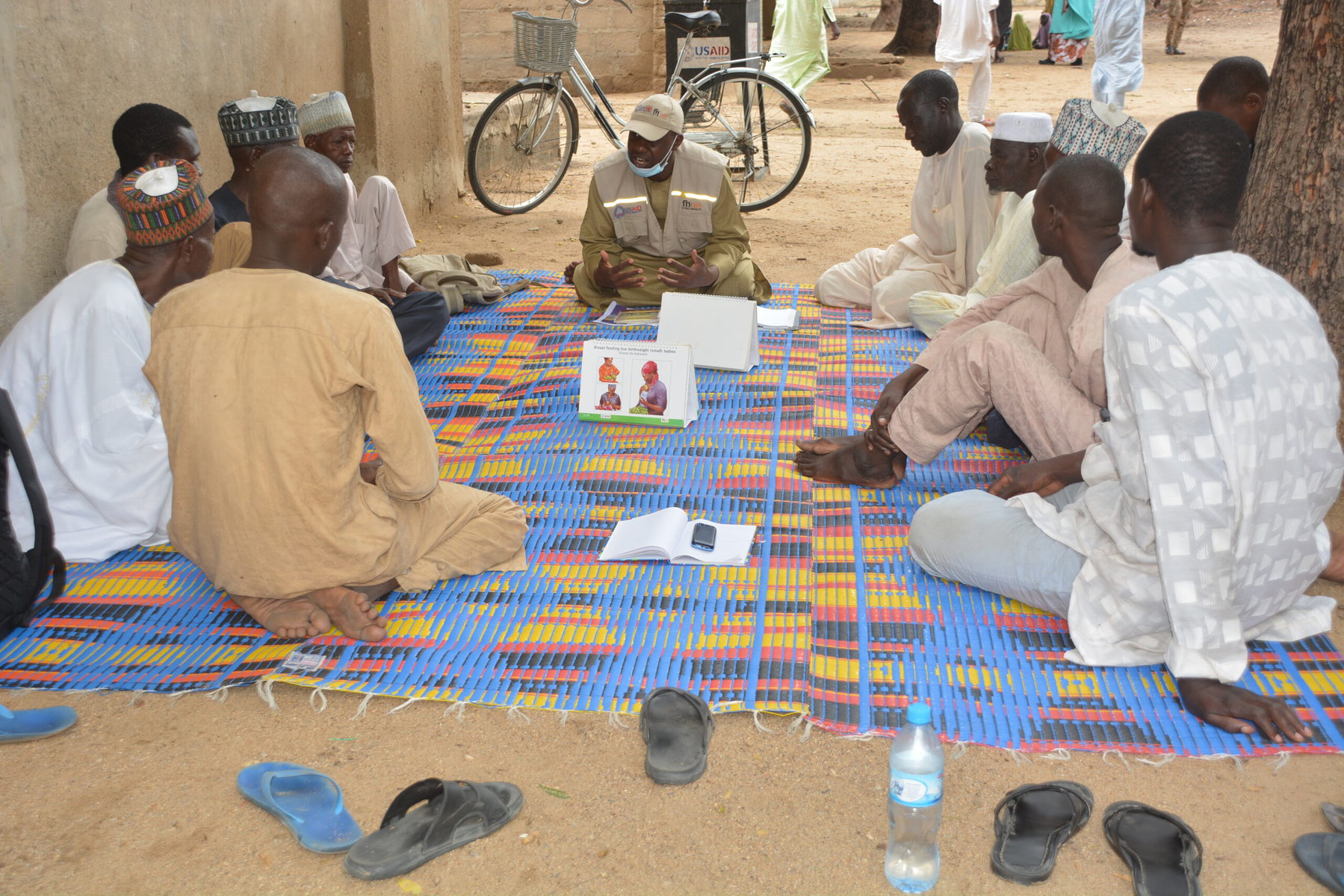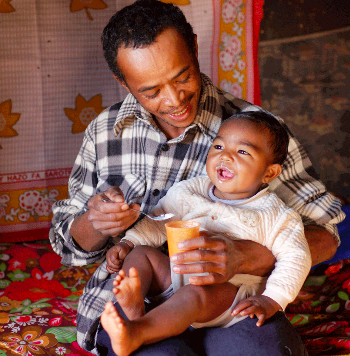During the rearing of his first four babies, Mohammed Bukar didn’t realize that his pregnant wife needed a different kind of diet. The 48-year-old trader from Borno State in northeast Nigeria thought it was simply best for nature to take its course.
“I didn’t know that when women are pregnant they need to eat more nutritious food, more fruits and vegetables,” says Bukar, who is from the village of Banki. “But since then I’ve learned a lot of things. There’s a lot that I can do to help.”
Like many fathers in rural Nigeria, Bukar also didn’t often step up when it came to child care and helping at home. Cultural norms mean that men are generally seen as the breadwinners of the household, whereas women are tasked with doing all of the domestic work — a predicament that exists in practically every country in the world.
Yet in recent years, as a humanitarian crisis has swept across the region following the rise of the terror group Boko Haram, that had to change. The violent conflict initially put seven million people across Nigeria’s four northeastern states “in desperate need of assistance” — half of them children, according to UNICEF, which estimated that 400,000 children had severe acute malnutrition in northeast Nigeria in 2017.

It was in response to that crisis that the role of husbands became clear. The global nonprofit FHI 360 found that the Nigerian mothers they were training and supporting to improve child nutrition in the region often said they were prevented from applying what they learned by men in their family. They wanted that to change.
“These women were not allowed to practice some of the skills that they had learned because of men,” says Solomon Atuman, FHI 360’s nutrition coordinator for the region. “They couldn’t fully implement the knowledge and the skills they had gotten.”
Men in Borno State are traditionally decision-makers in the household, says Atuman, whether they be husbands, fathers, grandfathers or even sons. Yet some believed, for example, that cholesterol was harmful to a baby and therefore that breastmilk should not be given to a newborn. “Even if they didn’t have the knowledge or skills to take care of the children, they would decide how the woman looks after the child,” he says.
In response, FHI 360 changed its approach. It created 484 “father-to-father” support groups, in order to provide the fathers in Borno State with better, accurate health information and to catalyze their involvement in maternal and child care. By using these male groups, the aim was to transcend the gendered, cultural barriers.
Weighed down by negative news?
Our smart, bright, weekly newsletter is the uplift you’ve been looking for.Each group — containing about 15 fathers, led by a trained male “facilitator” from the community — meets in person twice per month, discussing topics like the importance of hygiene practices, early initiation of breastfeeding, and maternal nutrition. They are also encouraged to support their families by doing household chores.
“If the woman is responsible for cleaning, household chores, getting firewood, there’s a limit to the amount of time the woman has left for child care,” says Atuman.
So when these mothers had the support of men in their lives for breastfeeding and other family activities, the picture drastically changed. An analysis conducted last year by FHI 360 and USAid, which provided funding for the project, found that these father-to-father support groups, which began in April 2019, yielded strong results.
More than 96 percent of the households in which fathers participated in support groups practiced exclusive breastfeeding — a practice key to providing nutrients — for the first six months of the baby’s life, compared with 57 percent of households that didn’t.
More mothers began breastfeeding within the first hour after birth (94 percent vs 59 percent), providing breast milk as the first food (96 percent vs 75 percent), and practicing complementary feeding at six months — using other foods alongside breast milk (90 percent vs 65 percent). At the same time, more husbands provided extra food during their partner’s last pregnancy (90 percent vs 71 percent) and dedicated more time to playing with their children (87 percent vs 66 percent).
Some 240 groups have graduated following completion of the counseling course, while another 244 groups are ongoing.
Bukar, who has three wives (polygamy, as in much of Nigeria, is common in the region), has had another six children since he joined his father-to-father support group in 2019. Compared to his previous children, the new babies have been “healthier and more joyful,” he says. And illnesses are rarer.
“I joined because we wanted to ensure the health and wellbeing of my family and my children,” says Bukar, who has also begun to help with household chores. “It is very important for men in Nigeria to help their wives.”
Fathers like Bukar could play a massive role in preventing malnutrition-related deaths of children worldwide by getting on board with breastfeeding. Undernutrition is linked to 45 percent of child deaths worldwide, according to the World Health Organization, yet more than 820,000 children under five years old could be saved each year if all children were optimally breastfed in their first two years of life.
“It’s very important that both parents are involved,” says Germaine Tuyisenge, who published a study in 2021 looking at Rwandan women’s perceptions of men’s roles in maternal health. “Women need support from their partners, even if sometimes it’s just to do with helping at home with chores or taking them to appointments.”
Tuyisenge’s research, which involved interviews with women in five Rwandan districts, found that “community-level discussions involving men and their roles in maternal healthcare” would improve maternal health outcomes and that such an approach would increase men’s involvement “without compromising women’s autonomy in decision-making on maternal health.”
“This is a very generalized issue,” says Tuyisenge. “But it’s experienced differently in different cultures and settings. For me, at least in my opinion, the best approach is whatever the women feel most comfortable with doing.”
The Nigerian program did have to adapt to fit the local cultures. Meetings, which were free, were organized with the help of community leaders and they were held in the evening, giving men time to come back from working on their farms.
There was still some resistance, too. “There were definitely some men we couldn’t convince,” says Atuman. At times, a grandfather would challenge his children who were in the support groups. The groups tweaked words they used, translating terms like breastfeeding in the local Hausa language, to make it more palatable for elders.
Musa Modu Abdallah, a 32-year-old also from Banki with four children and two wives, was one of the later converts to the program. Abdallah, who previously combined breast milk with cow and goat milk, joined a support group last year.
“I learned many things,” says Abdallah, proud to be in a wave of Nigerian fathers actively fighting for the wellbeing of their family. “It’s very important for us to do our part. When your wife and children are healthy, you can have peace of mind.”












